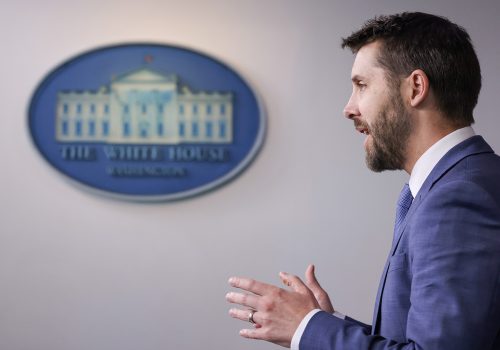Conclusion
The increasing capabilities and availability of data and new technologies change how nations remain competitive and secure. In the coming GeoTech Decade, data and technology will have a disproportionate impact on geopolitics, global competition, and global opportunities for collaboration as new capabilities may eliminate a technical advantage or may enable new processes superior to current methods. The United States and like-minded nations must be able to adapt and demonstrate effective governance, at faster speeds, in employing data and new technologies to promote a more secure, free, and prosperous world.
In 1945, Vannevar Bush, director of the Office of Scientific Research and Development, transmitted a report, Science – the Endless Frontier, with the goal of answering a few key questions asked by then-President Franklin D. Roosevelt in November 1944. In the report, Bush elaborated:
- “With particular reference to the war of science against disease, what can be done now to organize a program for continuing in the future the work which has been done in medicine and related sciences?
- “What can the Government do now and in the future to aid research activities by public and private organizations?
- “Can an effective program be proposed for discovering and developing scientific talent in American youth so that the continuing future of scientific research in this country may be assured on a level comparable to what has been done during the war?”
Among its recommendations, the 1945 report called for the creation of the National Research Foundation. Bush concluded, noting the importance of action by Congress:
- “Legislation is necessary. It should be drafted with great care. Early action is imperative, however, if this nation is to meet the challenge of science and fully utilize the potentialities of science. On the wisdom with which we bring science to bear against the problems of the coming years depends in large measure our future as a nation.”
Now, almost seventy-six years later, the GeoTech Commission similarly seeks to promote freedom and security through initiatives that employ data and new technologies to amplify the ingenuity of people, diversity of talent, strength of democratic values, innovation of companies, and the reach of global partnerships.
There are several areas where data and technology can help, or hinder, the achievement of these goals:
- Communications and networking, data science, cloud computing
- Artificial intelligence, distributed sensors, edge computing, the Internet of Things
- Biotechnologies, precision medicine, genomic technologies
- Space technologies, undersea technologies
- Autonomous systems, robotics, decentralized energy methods
- Quantum information science, nanotechnology, new materials for extreme environments, advanced microelectronics
To maintain national and economic security and competitiveness in the global economy, the United States and its allies must continue to be preeminent in these key areas, and must achieve trustworthy and assured performance of the digital economy and its infrastructure. The GeoTech Commission provided recommendations in the following seven areas where the United States and like-minded nations must succeed:
- Global science and technology leadership
- Secure data and communications
- Enhanced trust and confidence in the digital economy
- Assured supply chains and system resiliency
- Continuous global health protection and global wellness
- Assured space operations for public benefit
- Future of work
The report’s recommendations embody several ideals. First, work to ensure the benefits of new technologies reach all sectors of society. Second, define protocols and standards for permissible ways to develop and use technologies and data, consistent with the norms of the United States and like-minded nations. Third, guide technology cooperation and sharing with nondemocratic nations based on respecting democratic values.
Just as Vannevar Bush urged in 1945, the United States must create new ways to develop and employ future critical and emerging technologies at speed, cultivate the needed human capital, and establish norms for international cooperation with nations. Such creation requires important action by Congress and the new administration to ensure that the United States has the wisdom with which to apply science to the challenges and opportunities of the coming years. If enacted, the report’s recommendations will enable the United States and like-minded nations to employ data capabilities and new technologies intentionally to promote a freer, more secure, and more prosperous world.
Appendices
Biographies of the GeoTech Commission co-chairs and commissioners
Co-chairs
John Goodman, Chief Executive Officer, Accenture Federal Services
John Goodman is the Chief Executive of Accenture Federal Services (AFS), which serves clients across all sectors of the US federal government – defense, intelligence, public safety, health, and civilian. Since joining Accenture in 1998, he has held a variety of leadership roles – including managing director of Accenture’s Defense & Intelligence portfolio, head of Management Consulting for the global Public Service Operating Group, and most recently Chief Operating Officer of AFS. John began his career at Accenture as a Member of the Communications & High Technology practice.
Prior to joining Accenture, John served for five years in the federal government as Deputy Under Secretary of Defense (Industrial Affairs & Installations), Deputy Assistant Secretary of Defense (Industrial Affairs), and a member of the staff of the National Economic Council, the White House office responsible for coordination of economic policy. He previously served on the Harvard Business School faculty.
John is co-chair of the Atlantic Council’s GeoTech Commission and member of the boards of both the Atlantic Council and the Northern Virginia Technology Council, as well as a member of the Council on Foreign Relations. He is a member, and the immediate past chair, of the Executive Committee of the Professional Services Council, a former member of the Executive Committee of AFCEA, and the former chairman of the Defense Business Board. John was named Executive of the Year by the Greater Washington Government Contractors in 2018; a Wash100 inductee in 2018, 2019, 2020 and 2021; and a Fed100 Award winner in 2015. He has been awarded the Office of the Secretary of Defense Medal for Exceptional Public Service, the Department of Defense Medal for Distinguished Public Service, and the Department of Defense Medal for Outstanding Public Service.
John received his Bachelor of Arts, summa cum laude, from Middlebury College and his Master of Arts and Ph.D. from Harvard University.
Teresa Carlson, President and Chief Growth Officer, Splunk
As President and Chief Growth Officer at Splunk, Teresa Carlson leads our efforts to align and drive our ongoing business transformations across Splunk’s go-to-market segments. Most recently, Carlson served as Vice President, Worldwide Public Sector and Industries, for Amazon Web Services (AWS). After she founded AWS’s Worldwide Public Sector in 2010, Carlson’s role eventually expanded to include financial services, energy services, telecommunications, and aerospace and services industry business units.
Carlson has also been a strong advocate for empowering women in the technology field. That passion led to the creation of “We Power Tech,” AWS’s diversity and inclusion initiative, which aims to ensure underrepresented groups – including women – are reflected throughout all AWS outreach efforts. Carlson dedicates time to philanthropic and leadership roles in support of the global community. Prior to joining AWS in 2010, Carlson led sales, marketing and business development organizations at Microsoft, Keyfile/Lexign and NovaCare. Carlson holds a B.A. and M.S. from Western Kentucky University.
Honorary co-chairs
Mark R. Warner U.S. Senator from Virginia
Senator Warner was elected to the U.S. Senate in November 2008 and reelected to a third term in November 2020. He serves on the Senate Finance, Banking, Budget, and Rules Committees as well as the Select Committee on Intelligence, where he is the Chairman. During his time in the Senate, Senator Warner has established himself as a bipartisan leader who has worked with Republicans and Democrats alike to cut red tape, increase government performance and accountability, and promote private sector innovation and job creation. Senator Warner has been recognized as a national leader in fighting for our military men and women and veterans, and in working to find bipartisan, balanced solutions to address our country’s debt and deficit.
From 2002 to 2006, he served as Governor of Virginia. When he left office in 2006, Virginia was ranked as the best state for business, the best managed state, and the best state in which to receive a public education.
The first in his family to graduate from college, Mark Warner spent 20 years as a successful technology and business leader in Virginia before entering public office. An early investor in the cellular telephone business, he co-founded the company that became Nextel and invested in hundreds of start-up technology companies that created tens of thousands of jobs.
Senator Warner and his wife Lisa Collis live in Alexandria, Virginia. They have three daughters.
Rob Portman U.S. Senator for Ohio
Rob Portman is a United States Senator from the state of Ohio, a position he has held since he was first elected in 2010. Portman previously served as a U.S. Representative, the 14th United States Trade Representative, and the 35th Director of the Office of Management and Budget (OMB). In 1993, Portman won a special election to represent Ohio’s 2nd congressional district in the U.S. House of Representatives and served six terms before President George W. Bush appointed him as U.S. Trade Representative in May 2005. Portman currently serves as the Ranking Member on the Senate Homeland Security and Governmental Affairs Committee, as well as on the Senate Finance and Foreign Relations Committees. He was born and raised in Cincinnati, where he still lives today with his wife Jane. Together they have three children: Jed, Will, and Sally.
Suzan DelBene. U.S. Congresswoman Representing Washington’s 1st District
Congresswoman Suzan DelBene represents Washington’s 1st Congressional District, which spans from northeast King County to the Canadian border and includes parts of King, Snohomish, Skagit, and Whatcom counties. First sworn into the House of Representatives in November 2012, Suzan brings a unique voice to the nation’s capital with more than two decades of experience as a successful technology entrepreneur and business leader. Suzan takes on a wide range of challenges both in Congress and in the 1st District and is a leader on issues of technology, health care, trade, taxes, environmental conservation, and agriculture.
Suzan currently serves as the Vice Chair on the House Ways and Means Committee, which is at the forefront of debate on a fairer tax code, health care reform, trade deals, and lasting retirement security. She serves on the Select Revenue Measures and Trade Subcommittees. Suzan also serves as Chair of the forward-thinking New Democrat Coalition, which is one of the largest ideological coalitions in the House, and is co-chair of the Women’s High Tech Caucus, Internet of Things Caucus, and Dairy Caucus. She is also a member of the Pro-Choice Caucus.
Over more than two decades as an executive and entrepreneur, she helped to start drugstore.com as Vice President of Marketing and Store Development, and served as CEO and President of Nimble Technology, a business software company based on technology developed at the University of Washington. Suzan also spent 12 years at Microsoft, most recently as corporate vice president of the company’s mobile communications business.
Before being elected to Congress, Suzan served as Director of the Washington State Department of Revenue. During her tenure, she proposed reforms to cut red tape for small businesses. She also enacted an innovative tax amnesty program that generated $345 million to help close the state’s budget gap while easing the burden on small businesses.
Suzan and her husband, Kurt DelBene, have two children, Becca and Zach, and a dog named Reily.
Michael T. McCaul, U.S. Congressman Representing Texas’ 10th District
Congressman Michael T. McCaul is currently serving his ninth term representing Texas’ 10th District in the United States Congress. The 10th Congressional District of Texas stretches from the city of Austin to the Houston suburbs and includes Austin, Bastrop, Colorado, Fayette, Harris, Lee, Travis, Washington and Waller Counties.
At the start of the 116th Congress, Congressman McCaul became the Republican Leader of the Foreign Affairs Committee. This committee considers legislation that impacts the diplomatic community, which includes the Department of State, the Agency for International Development (USAID), the Peace Corps, the United Nations, and the enforcement of the Arms Export Control Act. In his capacity as the committee’s Republican Leader, McCaul is committed to ensuring we promote America’s leadership on the global stage. In his view, it is essential the United States bolsters international engagement with our allies, counters the aggressive policies of our adversaries, and advances the common interests of nations in defense of stability and democracy around the globe. He will continue to use his national security expertise to work to counter threats facing the United States, especially the increasing threat we face from nation state actors such as China, Iran, Russia, North Korea, among others.
Prior to Congress, Michael McCaul served as Chief of Counter Terrorism and National Security in the U.S. Attorney’s office, Western District of Texas, and led the Joint Terrorism Task Force charged with detecting, deterring, and preventing terrorist activity. McCaul also served as Texas Deputy Attorney General under current U.S. Senator John Cornyn, and served as a federal prosecutor in the Department of Justice’s Public Integrity Section in Washington, DC.
A fourth generation Texan, Congressman McCaul earned a B.A. in Business and History from Trinity University and holds a J.D. from St. Mary’s University School of Law. In 2009 Congressman McCaul was honored with St. Mary’s Distinguished Graduate award. He is also a graduate of the Senior Executive Fellows Program of the School of Government, Harvard University. Congressman McCaul is married to his wife, Linda. They are proud parents of five children: Caroline, Jewell, and the triplets Lauren, Michael, and Avery.
Commissioners
Max R. Peterson II, Vice President, Worldwide Public Sector, Amazon Web Services
Max Peterson is Vice President for Amazon Web Services’ (AWS) Worldwide Public Sector. In this role, Max supports public sector organizations as they leverage the unique advantages of commercial cloud to drive innovation among government, educational institutions, health care institutions, and nonprofits around the world.
A public sector industry veteran with thirty years of experience, he has an extensive background in developing relationships with public sector customers. He has previously worked with Dell Inc. as Vice President and General Manager for Dell Federal Civilian and Intelligence Agencies, as well as CDWG and Commerce One.
Max earned both a Bachelor’s Degree in Finance and Master’s of Business Administration in Management Information Systems from the University of Maryland.
Paul Daugherty, Accenture Chief Executive – Technology and Chief Technology Officer
Paul Daugherty is Accenture’s Group Chief Executive – Technology & Chief Technology Officer. He leads all aspects of Accenture’s technology business. Paul is also responsible for Accenture’s technology strategy, driving innovation through R&D in Accenture Labs and leveraging emerging technologies to bring the newest innovations to clients globally. He recently launched Accenture’s Cloud First initiative to further scale the company’s market-leading cloud business and is responsible for incubating new businesses such as blockchain, extended reality and quantum computing. He founded and oversees Accenture Ventures, which is focused on strategic equity investments and open innovation to accelerate growth. Paul is responsible for managing Accenture’s alliances, partnerships and senior-level relationships with leading and emerging technology companies, and he leads Accenture’s Global CIO Council and annual CIO and Innovation Forum. He is a member of Accenture’s Global Management Committee.
Maurice Sonnenberg, Guggenheim Securities
Maurice Sonnenberg has served as an outside advisor to five Presidential Administrations in the areas of international trade, finance, international relations, intelligence, and foreign election monitoring. In 1994 and 1995, he served as a member of the US Commission on Protecting and Reducing Government Secrecy, and from 1996 as the Senior Advisor to the US Commission on the Roles and Capabilities of the US Intelligence Community. He was a member of the President’s Foreign Intelligence Advisory Board under President Bill Clinton for 8 years. In 2002, he was a member of the Task Force of Terrorist Financing for the Council on Foreign Relations. From 2007-2010, he served on the Department of Homeland Security Advisory Council and the Panel Advisory Board for the Secretary of the Navy from 2008-2015. In 2012-14, he served as co-Chairman of the National Commission for the Review of the Research and Development Programs for the Intelligence Community. He has also served as an Official US Observer at elections in Latin America. This includes multiple elections in El Salvador, Guatemala, Nicaragua and Mexico. Sonnenberg has worked at the investment banking firms Donaldson Lufkin and Jenrette, Bear Stearns, and J.P. Morgan, and at the law firms Hunton & Williams, Manatt, Phelps & Phillips. Currently, he is with Guggenheim Securities as Senior International Advisor. He is also a Senior Advisor to the Advanced Metallurgical Group, N.V.
Michael Chertoff, Former U.S. Secretary of Homeland Security
Michael Chertoff is the Executive Chairman and Co-Founder of The Chertoff Group. From 2005 to 2009, he served as Secretary of the U.S. Department of Homeland Security. Earlier in his career, Mr. Chertoff served as a federal judge on the U.S. Court of Appeals for the Third Circuit and head of the U.S. Department of Justice’s Criminal Division. He is the Chairman of the Board of Directors of BAE Systems, Inc., the U.S.-based subsidiary of BAE Systems plc. In 2018, he was named the chairman of the Board of Trustees for Freedom House. He currently serves on the board of directors of Noblis and Edgewood Networks. In the last five years, Mr. Chertoff co-chaired the Global Commission in Stability of Cyberspace and also co-chairs the Transatlantic Commission on Election Integrity. Chertoff is magna cum laude graduate of Harvard College and Harvard Law School.
Michael J. Rogers, Former Chairman of the U.S. House Permanent Select Committee on Intelligence
Mike Rogers is a former member of Congress, where he represented Michigan’s Eighth Congressional District for seven terms. While in the U.S. House of Representatives, he chaired the powerful House Permanent Select Committee on Intelligence (HPSCI), authorizing and overseeing a budget of $70 billion that funded the nation’s seventeen intelligence agencies. Mr. Rogers built a legacy as a bipartisan leader on cybersecurity, counterterrorism, intelligence, and national security policy. Mr. Rogers worked with two presidents, congressional leadership, and countless foreign leaders, diplomats, and intelligence professionals. Before joining Congress, he served as an officer in the US Army and as a Special Agent with the FBI. He is currently investing in and helping build companies that are developing solutions for healthcare, energy efficiency, and communications challenges. He also serves as a regular national security commentator on CNN and hosted the channel’s documentary-style original series Declassified. Mr. Rogers is a regular public speaker on global affairs, cybersecurity, and leadership. He is married to Kristi Rogers and has two children.
Pascal Marmier, Head, Economy of Trust Foundation, SICPA
Pascal Marmier is head of SICPA’s Economy of Trust Foundation. Most recently, Marmier held several positions in the United States within Swiss Re, a global reinsurer, focusing on digital strategy and innovation management. Previously, he spent twenty years as a Swiss diplomat as one of the early leaders of the Swissnex network, a private–public partnership dedicated to facilitating collaboration with Swiss universities, startups, and corporations in all fields related to science, technology, and innovation. After spending a decade establishing key partnerships and activities in Boston, Marmier moved to China to establish the Swissnex platform in the region. He holds law degrees from the University of Lausanne and Boston University, as well as an MBA from the MIT Sloan School of Management.
Ramayya Krishnan, PhD, Director, Block Center for Technology and Society, Carnegie Mellon University
Ramayya Krishnan is the W. W. Cooper and Ruth F. Cooper Professor of Management Science and Information Systems at Carnegie Mellon University. He is Dean of the H. John Heinz III College of Information Systems and Public Policy and directs the Block Center for Technology and Society at the university. His scholarly contributions have focused on mathematical modeling of organizational decision making, the design of data driven decision support systems and statistical models of consumer behavior in digital environments. He advises governments, businesses and development banks on digital transformation technology and its consequences.
Dr. Shirley Ann Jackson, President, Rensselaer Polytechnic Institute
The Honorable Shirley Ann Jackson, Ph.D., has served as the 18th president of Rensselaer Polytechnic Institute since 1999. A theoretical physicist described by Time Magazine as “perhaps the ultimate role model for women in science,” Dr. Jackson has held senior leadership positions in academia, government, industry, and research. She is the recipient of many national and international awards, including the National Medal of Science, the United States’ highest honor for achievement in science and engineering. Dr. Jackson served as Co-Chair of the United States President’s Intelligence Advisory Board from 2014 to 2017 and as a member of the President’s Council of Advisors on Science and Technology from 2009 to 2014. Before taking the helm at Rensselaer, she was Chairman of the U.S. Nuclear Regulatory Commission from 1995 to 1999. She serves on the boards of major corporations that include FedEx and PSEG, where she is Lead Director.
Dr. Jackson holds an S.B. in Physics, and a Ph.D. in Theoretical Elementary Particle Physics, both from MIT.
Susan M. Gordon, Former Principal Deputy Director of National Intelligence
The Honorable Susan (Sue) M. Gordon served as Principal Deputy Director of National Intelligence from August 2017 until August 2019. In her more than three decades of experience in the IC, Ms. Gordon served in a variety of leadership roles spanning numerous intelligence organizations and disciplines, including serving as the Deputy Director of the National Geospatial-Intelligence Agency (NGA) from 2015 to 2017. In this role, she drove NGA’s transformation to meet the challenges of a 21st century intelligence agency. Since leaving government service, Ms. Gordon serves on a variety of public and private boards, is a fellow at Duke and Harvard Universities, and consults with a variety of companies on technology—including cyber and space—strategy, and leadership, focusing on shared responsibility for national and global security.
Vint Cerf
Vinton G. Cerf is vice president and Chief Internet Evangelist for Google. Cerf is the codesigner of the TCP/IP protocols and the architecture of the Internet. He has served in executive positions at the Internet Corporation for Assigned Names and Numbers, the Internet Society, MCI, the Corporation for National Research Initiatives, and the Defense Advanced Research Projects Agency. A former Stanford Professor and member of the National Science Board, he is also the past president of the Association for Computing Machinery and serves in advisory capacities at the National Institute of Standards and Technology, the Department of Energy, and the National Aeronautics and Space Administration. Cerf is a recipient of numerous awards for his work, including the US Presidential Medal of Freedom, US National Medal of Technology, the Queen Elizabeth Prize for Engineering, the Prince of Asturias Award, the Tunisian National Medal of Science, the Japan Prize, the Charles Stark Draper Prize, the ACM Turing Award, the Legion d’Honneur, the Franklin Medal, Foreign Member of the British Royal Society and Swedish Academy of Engineering, and twenty-nine honorary degrees. He is a member of the Worshipful Company of Information Technologists and the Worshipful Company of Stationers.
Zia Khan, PhD, Vice President for Innovation, The Rockefeller Foundation
As Senior Vice President for Innovation, Zia Khan oversees the Rockefeller Foundation’s approach to developing solutions that can have a transformative impact on people’s lives through the use of convenings, data and technology, and strategic partnerships. He writes and speaks frequently on leadership, strategy, and innovation. Khan has served on the World Economic Forum Advisory Council for Social Innovation and the US National Advisory Board for Impact Investing. He leads a range of the Rockefeller Foundation’s work in applying data science for social impact and ensuring artificial intelligence contributes to an inclusive and equitable future.
Prior to joining the Rockefeller Foundation, Khan was a management consultant advising leaders in technology, mobility, and private equity sectors. He worked with Jon Katzenbach on research related to leadership, strategy, and organizational performance, leading to their book, Leading Outside the Lines.
Zia holds a BS from Cornell University and MS and PhD from Stanford University.
Anthony Scriffignano, PhD, is Senior Vice President, Chief Data Scientist at Dun & Bradstreet Corporation
Anthony Scriffignano, PhD is Senior Vice President, Chief Data Scientist at Dun & Bradstreet Corporation. He is an internationally recognized data scientist with experience spanning over forty years in multiple industries and enterprise domains. Scriffignano has extensive background in advanced anomaly detection, computational linguistics and advanced inferential algorithms, leveraging that background as primary inventor on multiple patents worldwide. Scriffignano was recognized as the U.S. Chief Data Officer of the Year 2018 by the CDO Club, the world’s largest community of C-suite digital and data leaders. He is also a member of the OECD Network of Experts on AI working group on implementing Trustworthy AI, focused on benefiting people and the planet. He has briefed the US National Security Telecommunications Advisory Committee and contributed to three separate reports to the president, on Big Data Analytics, Emerging Technologies Strategic Vision, and Internet and Communications Resilience. Additionally, Scriffignano provided expert advice on private sector data officers to a group of state Chief Data Officers and the White House Office of Science and Technology Policy. Scriffignano serves on various advisory committees in government, private sector, and academia. Most recently, he has been called upon to provide insight on data science implications in the context of a highly disrupted datasphere and the implications of the global pandemic. He is considered an expert on emerging trends in advanced analytics, the “Big Data” explosion, artificial intelligence, multilingual challenges in business identity and malfeasance in commercial and public-sector contexts.
Frances F. Townsend, Executive Vice President, Activision Blizzard
Frances Fragos Townsend is the Executive Vice President of Corporate Affairs, Chief Compliance Officer and Corporate Secretary at Activision Blizzard. Prior to that, she was Vice Chairman, General Counsel and Chief Administration Officer at MacAndrews & Forbes, Inc. In her 10 years there, she focused internally on financial, legal and personnel issues, as well as international, compliance and business development across MacAndrews’ portfolio companies. Prior to that, she was a corporate partner with the law firm of Baker Botts, LLP. From 2004 to 2008, Ms. Townsend served as Assistant to President George W. Bush for Homeland Security and Counterterrorism and chaired the Homeland Security Council. She also served as Deputy National Security Advisor for Combatting Terrorism from 2003 to 2004. Ms. Townsend spent 13 years at the US Department of Justice under the administrations of President George H. W. Bush, President Bill Clinton and President George W. Bush. She has received numerous awards for her public service accomplishments. Ms. Townsend is a Director on the Board of two public companies: Chubb and Freeport McMoRan. She previously served on the Boards at Scientific Games, SciPlay, SIGA and Western Union. She is an on-air senior national security analyst for CBS News. Ms. Townsend previously served on the Director of National Intelligence’s Senior Advisory Group, the Central Intelligence Agency’s (CIA) External Advisory Board and the US President’s Intelligence Advisory Board. Ms. Townsend is a trustee on the Board of the New York City Police Foundation, the Intrepid Sea, Air & Space Museum, the McCain Institute, the Center for Strategic and International Studies (CSIS) and the Atlantic Council. She also serves on the Board at the Council on Foreign Relations, on the Executive Committee of the Trilateral Commission and the Board of the International Republican Institute. She is a member of the Aspen Strategy Group.
Admiral James Stavridis, USN, Ret.
Admiral James Stavridis is an Operating Executive of The Carlyle Group and Chair of the Board of Counselors of McLarty Global Associates, following five years as the 12th Dean of The Fletcher School of Law and Diplomacy at Tufts University. He also serves as the Chairman of the Board of the Rockefeller Foundation. A retired four-star officer in the U.S. Navy, he led the North Atlantic Treaty Organization (NATO) Alliance in global operations from 2009 to 2013 as Supreme Allied Commander with responsibility for Afghanistan, Libya, the Balkans, Syria, counter piracy and cyber security. He also served as Commander of U.S. Southern Command, with responsibility for all military operations in Latin America from 2006 to 2009. He earned more than 50 medals, including 28 from foreign nations in his 37-year military career. Admiral Stavridis earned a PhD in international relations and has published 10 books and hundreds of articles in leading journals around the world, including the recent novel “2034: A Novel of the Next World War,” which was a New York Times bestseller. His 2012 TED Talk on global security has close to one million views. Admiral Stavridis is a monthly columnist for TIME Magazine and Chief International Security Analyst for NBC News.
Biographies of supporting Atlantic Council staff
Dr. David A. Bray, Director, GeoTech Center, Atlantic Council
Dr. David A. Bray has served in a variety of leadership roles in turbulent environments, including bioterrorism preparedness and response from 2000 to 2005, time on the ground in Afghanistan in 2009, serving as a non-partisan Senior National Intelligence Service Executive directing a bipartisan National Commission for the Review of the Research and Development Programs of the US Intelligence Community, and providing leadership as a non-partisan federal agency Senior Executive where he led a team that received the global CIO 100 Award twice in 2015 and 2017. He is an Eisenhower Fellow, Marshall Memorial Fellow, and Senior Fellow with the Institute for Human & Machine Cognition. Business Insider named him one of the top “24 Americans Who Are Changing the World” and the World Economic Forum named him a Young Global Leader. Over his career, he has advised six different start-ups, led an interagency team spanning sixteen different agencies that received the National Intelligence Meritorious Unit Citation, and received the Joint Civilian Service Commendation Award, the National Intelligence Exceptional Achievement Medal, Arthur S. Flemming Award, as well as the Roger W. Jones Award for Executive Leadership. He is the author of more than forty academic publications, was invited to give the AI World Society Distinguished Lecture to the United Nations in 2019, and was named by HMG Strategy as one of the Global “Executives Who Matter” in 2020.
Dr. Peter Brooks, Consultant, GeoTech Center, Atlantic Council
Peter Brooks is a senior researcher and national security analyst at the Institute for Defense Analyses, a federally funded research and development center. For more than three decades, he has contributed to the understanding of critical national security issues for a wide range of government agencies. His broad expertise includes intelligence analysis, advanced technologies and applications, and joint force analyses, experimentation, strategy, and cost assessments.
Stephanie Wander, Deputy Director, GeoTech Center, Atlantic Council
Stephanie Wander is a technology and innovation strategist with a successful track record of launching large-scale projects to solve global grand challenges. Ms. Wander’s approaches integrate innovation best practices and mindsets, including design thinking, behavior change strategies, foresight techniques, and expert and public crowdsourcing.
Previously, Ms. Wander was a lecturer at the University of Southern California Suzanne Dworak-Peck School of Social Work where she taught graduate social work professionals in design, innovation, and disruptive technology.
Rose Butchart, Senior Adviser, National Security Initiatives, GeoTech Center, Atlantic Council
Rose Butchart is the senior adviser for National Security Initiatives at the Atlantic Council’s GeoTech Center.
As a program manager for the Department of Defense’s National Security Innovation Network, she managed, designed, and scaled a variety of programs, including a technology, transfer, and transition (T3) program designed to bring breakthrough Department of Defense lab technology to market— and to the warfighter. She also managed a workshop series to tackle some of the military’s intractable problems and a fellowship which placed active duty military and Department of Defense civilians at technology start-ups.
Claudia Vaughn Zittle, Program Assistant, Atlantic Council GeoTech Center
Claudia Vaughn Zittle was a program assistant with the Atlantic Council’s GeoTech Center. In this role, she managed a wide range of projects at the intersection of emerging technologies and dynamic geopolitical landscapes. She also conducted research and provided written analysis for publication on Atlantic Council platforms.
Originally from the Washington, DC, area, she received her BA in International Relations from Cornell College. She is continuing her education at American University’s School of International Service, where she studies International Relations with a concentration in US Foreign Policy and National Security.
Claire Branley, Program Assistant, Atlantic Council GeoTech Center
Claire Branley joined the Atlantic Council’s Geotech Center after graduating from the University of Washington with a BS in Public Health and Global Health. She was a research assistant in the Moussavi-Harami Lab, uncovering gene therapies for inherited heart disease. She is deeply passionate about the prevention of disease and has assisted several maternal and child health research projects and volunteered in farm-to-food pantry initiatives to decrease food insecurity in the Seattle area. Her interests include chronic disease burden, global food security, and promoting interdisciplinary solutions.
Biographies of the key contributors to the GeoTech Commission Report
Research and writing on misinformation
Dr. Pablo Breuer, Nonresident Senior Fellow, GeoTech Center, Atlantic Council
Dr. Pablo Breuer is an information/cyber warfare expert and a twenty-two-year veteran of the US Navy with tours including the National Security Agency, US Cyber Command, and United States Special Operations Command. He is a cofounder of the Cognitive Security Collaborative and coauthor of the Adversarial Misinformation and Influence Tactics and Techniques (AMITT) framework.
Dr. Robert Leonhard, National Security Analysis, Johns Hopkins University Applied Physics Laboratory
Robert Leonhard is on the principal professional staff as an analyst in the National Security Analysis Department of Johns Hopkins University’s Applied Physics Laboratory (JHU/APL). His main areas of focus are irregular warfare, nuclear deterrence, and game design. Prior to joining JHU/APL, he earned a PhD in American History from West Virginia University, a Master of Military Arts and Sciences from the US Army, an MS in International Relations from Troy State University, and a BS in European History from Columbus University. He is a retired Army infantry officer and planner. He is the author of The Art of Maneuver (Presidio Press, 1991), Fighting by Minutes: Time and the Art of War (Praeger, 1994), The Principles of War for the Information Age (Presidio Press, 1998), Little Green Men: a primer in Russian Unconventional Warfare, Ukraine 2013-2014 (JHUAPL, 2016), and The Defense of Battle Position Duffer: Cyber-Enabled Maneuver in Multi-Domain Battle (JHUAPL, 2016). He may be contacted at Robert.Leonhard@jhuapl.edu.
John Renda, Program Manager, Army Special Operations, Johns Hopkins University Applied Physics Laboratory
Col. John Renda, USA (Ret), is a program manager for Army Special Operations at the Johns Hopkins University’s Applied Physics Laboratory. He graduated from Tulane University with a degree in Political Science and International Relations, and earned a MS in National Security from the US Naval War College. He served as a career Psychological Operations officer in US Army Special Operations. His key assignments included 75th Ranger Regiment Information Operations Officer, 1st Psychological Operations Battalion Commander, United States Special Operations Command (USSOCOM) Director J39 National Capital Region, and National Security Council Staff, Director for Strategic Communication. He may be contacted at john.renda@jhuapl.edu.
Dr. Sara-Jayne Terp, Nonresident Senior Fellow, GeoTech Center, Atlantic Council
Sara-Jayne Terp builds frameworks to improve how autonomous systems, algorithms, and human communities work together. At Threet Consulting, she creates processes and technologies to support community-led disinformation defence. She is an Atlantic Council Senior Fellow, CogSecCollab lead, and chair at CAMLIS and Defcon AI Village. Her background includes intelligence systems, crowdsourced data gathering, autonomous systems (e.g., human-machine teaming), data strategy, data ethics, policy, nation state development, and crisis response.
Appendix B
Stewart Scott, Assistant Director, GeoTech Center, Atlantic Council
Stewart Scott is an assistant director with the Atlantic Council’s GeoTech Center, where he conducts research and provides written analysis for publication on Atlantic Council platforms and works on joint projects with other centers in the Atlantic Council. He earned his AB, along with a minor in Computer Science, at the School of Public and International Affairs at Princeton University.
We would also like to thank the following members of the Atlantic Council’s Cyber Statecraft Initiative for their contributions to Appendix B: Trey Herr, Simon Handler, Madison Lockett, Will Loomis, Emma Schroeder, and Tianjiu Zuo.
Appendix C and writings on global health
Dr. Divya Chander, Nonresident Senior Fellow, GeoTech Center, Atlantic Council
Dr. Chander is a physician and neuroscientist who trained at Harvard, University of California San Diego, University of California San Francisco, and the Salk Institute. She has been on the Anesthesiology Faculty at Stanford University since 2008 and Neuromedicine Faculty at Singularity University since 2010. Her postdoctoral training in optogenetic technology was conducted in the laboratories of Karl Deisseroth and Luis de Lecea at Stanford University, where she used light-activated ion channels inserted in DNA to study sleep and consciousness switches in brains. She is currently working on applications of neural wearable devices to crossover consumer and medical markets.
Appendix D
Inkoo Kang, Research Consultant, GeoTech Center, Atlantic Council
US Air Force 2nd Lt. Inkoo Kang is a research consultant for the Atlantic Council’s GeoTech Center. At the Atlantic Council, he conducts research and provides written analyses on the increasingly important role of outer space for social, economic, and military operations. His main interest focuses on how emerging technologies are merging military, diplomatic, humanitarian, and economic challenges and how the military must learn to adapt to such threats.
Appendix E
Borja Prado, Research Assistant, GeoTech Center Atlantic Council
Borja Prado holds an MS in Foreign Service (MSFS) from Georgetown University, where he concentrated in Global Politics and Security, focusing on the impact of disruptive technologies on governments, businesses, and societies.
He aims to apply his research experience, language skills, and strong background in technology and global affairs to help governments, businesses, and societies succeed in this increasingly uncertain era.
Acknowledgements
We would like to thank the following members of the Commission Co-Chair teams for their assistance, expertise, and technical review of the report:
- Stoney Burke, Head of Federal Affairs and Public Policy, Amazon Web Services
- Ira Entis, Managing Director, Growth and Strategy Lead, Accenture Federal Services
- Geoffrey Kahn, Managing Director, Government Relations, Accenture
- Pamela Merritt, Managing Director, Federal Marketing and Communications, Accenture Federal Services
- Davis Pace, Professional Staff Member, House Foreign Affairs Committee
- Sean Sweeney, Manager, Government Relations, Accenture
- Clayton Swope, Senior Manager, National Security Public Policy, Amazon Web Services
- Carolyn Vigil, Senior Customer Engagement Manager, Amazon Web Services
We would like to acknowledge the following individuals for their review and commentary on relevant sections of the report: Laura Bate, Natalie Barrett, Pablo Breuer, Mark Brunner, Mung Chiang, Kevin Clark, Donald Codling, Carol Dumaine, Ryan G. Faith, Melissa Flagg, James F. Geurts, Jasper Gilardi, Bob Gourley, Bob Greenberg, Simon Handler, Henry Hertzfeld, Robert Hoffman, Erich James Hösli, Diane M. Janosek, William Jeffrey, Charles Jennings, Declan Kirrane, John J. Klein, Sandra J. Laney, John Logsdon, Robert Lucas, Lauren Maffeo, Jerry Mechling, Ivan Medynskyi, Ben King, Ben Murphy and the team at Reaching the Future Faster LLC, James Olds, Nikhil Raghuveera, Matthew Rose, Benjamin Schatz, Emma Schroeder, Jeremy Spaulding, Keith Strier, Daniella Taveau, Trent Teyema, Bill Valdez, and Tiffany Vora.
We also would like to express sincere appreciation to individuals both internal and external to the Atlantic Council for help in preparing this report for final publication. Their professional and dedicated efforts were essential to this work.
Lastly, we want to thank all the GeoTech Fellows and GeoTech Action Council members, each of whom embodies the spirit of the new Center as we look to the future ahead: Be bold. Be Brave. Be Benevolent.









